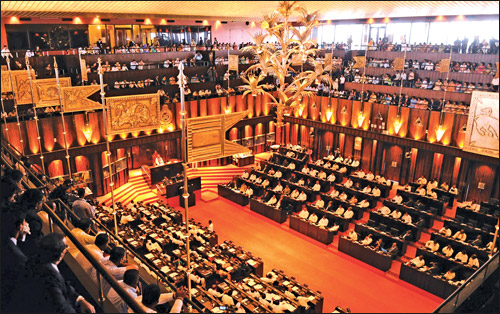Suggestions to improve Parliamentary system
Chanaka Amaratunga
******-----
This essay is a shortened version of a summary
of conclusions of a Seminar Series on Constitutional Reform initiated by
the Council for Liberal Democracy in November 1987, which were concerned
with the role and structure of Parliament
[Functions of Parliament]
* Enacting legislation
* Scrutinizing the Government’s acts
* Addressing issues of national policy
* Respecting the rights of political minorities
It was agreed that the current Parliament had deteriorated and been
greatly devalued in relation to its predecessors. Many thought this was
not particular to
|

Parlament, the centre of country’s democracy. File photo |
Parliament under the 1978 Constitution, though the
situation became worse under that Constitution. Devaluation began with
the Constitution of 1972 when absolute power was concentrated in the
National State Assembly (as Parliament was than named). For the first
time executive, legislative and even judicial power were concentrated in
the legislature. This supreme power of the National State Assembly meant
its unrestrained use by the parties that commanded a majority.
Under the Soulboury Constitution there was demarcation of
responsibility between the executive (the Cabinet), the legislature
(Parliament), and the Judiciary. Parliament then, in terms of the need
for diversity and checks and balances, consisted of two chambers.
Despite the Cabinet consisting, according to the British
Parliamentary tradition, of members of the two houses of Parliament,
some differentiation of functions, as well as greater respect for
diversity in Parliament, was maintained. This more balanced approach was
overturned by the 1972 Constitution, which declared the legislature to
be the ‘supreme instrument of State power’.
It was noted that the system of executive committees under the
Donoughmore Constitution had been useful. Such a system should be
revived, whereas multi-party democracy in Sri Lanka, given the party
system and the prevailing style of Parliamentary government, had divided
the people.
Patronage based on these divisions led to deprivation and bitterness.
In the context of an underdeveloped country with a multi-ethnic,
multi-religious, multi-lingual society, the current adversarial
political system inherited from the Westminster model of Cabinet
Government created dangers.
This is worse since it has been adapted to a Presidential system
which still requires all ministers to be Members of Parliament, with all
appointed from the dominant political party.
A remedy was to incorporate some features of the executive committee
system so that Members of Parliament of opposition political parties
could also have some executive authority. This would minimize the
current sense of marginalization of those in opposition.
So as to strengthen Parliament and to arrest its current weakness, it
was felt that expulsion or resignation from the political party on whose
ticket a Member of Parliament was elected should not result in expulsion
from the house. Difficulties that arose from resignation from a
political party, in a context of proportional representation, were
discussed. A suggestion was made that a by-election should take place if
a Member of Parliament resigned from his party.
There was agreement that Parliament should be elected under a scheme
of proportional representation, but it was noted that most systems of
proportional representation increased the political control of party
hierarchies.
The adverse effects of a proportional system would be reduced by the
adoption of a mixed system such as the German one.
The role of the Cabinet
The issue of whether the powers of Parliament declined with the
establishment of the Executive Presidency was discussed. Though this had
happened, it was noted that this was the formalization of a trend which
had developed over time, the concentration of political power in a
single leader. What had in fact occurred was that powers which the Prime
Minister had in real terms exercised had formally been conferred on the
new Chief Executive, the President.
To be continued
|



